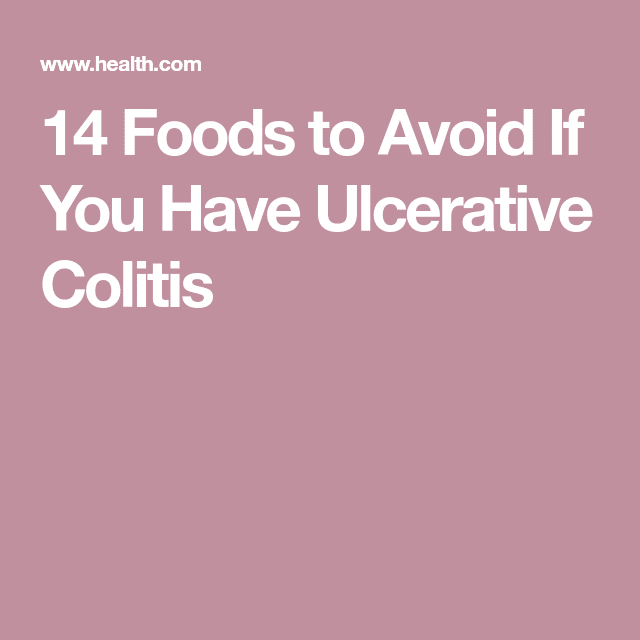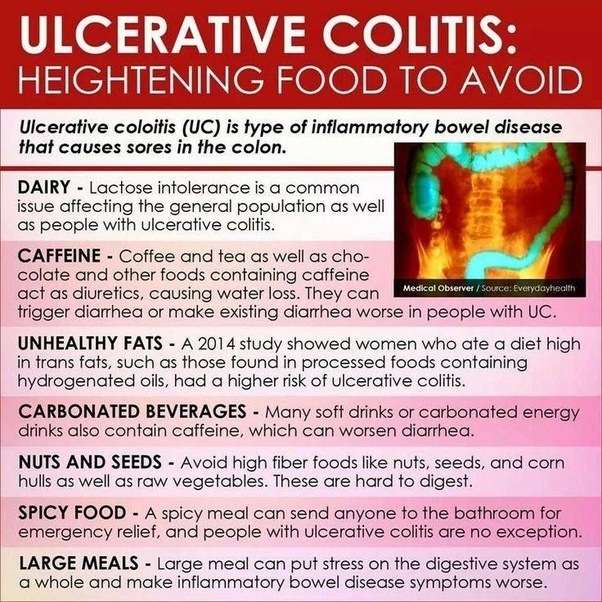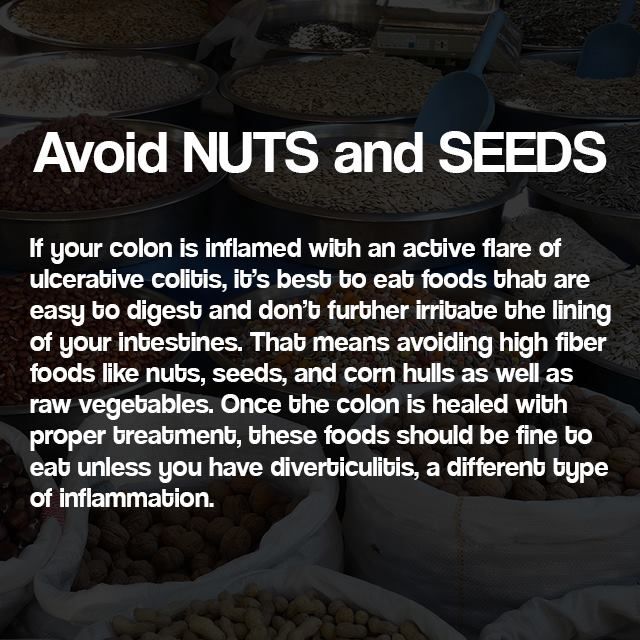Foods To Eat With Ulcerative Colitis
Understanding inflammatory bowel diseases like ulcerative colitis can be difficult, especially knowing what foods to eat. An ulcerative colitis flare can be exacerbated when eating inflammatory foods. Likewise, one can easily become nutrient deficient if there is a lack of variety in the diet. Here we look into some recommended foods to eat when you have an ulcerative colitis flare.
Your nutrition affects your overall health and well-being. When you do not get the proper nutrients, you can experience ulcerative colitis complications like weight loss, malnutrition, and nutritional deficiencies. Before we dive into the foods that you should eat, here are a few tips that can help improve your health and reduce the frequency of flare ups.
Dairy Is A Common Trigger Food For People With Ulcerative Colitis
Lactose intolerance is a common issue affecting the general population, as well as people with ulcerative colitis, says Themistocles Dassopoulos, MD, the director of the Baylor Center for Inflammatory Bowel Disease in Dallas. Lactose intolerance prevents you from properly digesting lactose, the sugar found in milk and dairy products, because the small intestine lacks the digestive enzyme called lactase. While dairy doesnt seem to cause UC flares, lactose intolerance can cause symptoms such as abdominal pain and diarrhea that can be mistaken for UC. Avoid dairy products or add lactase supplements to reduce these symptoms.
Which Foods Have The Most
When it comes to vegetables, few people are eating large quantities of the sulfur-rich types e.g. cruciferous vegetables like broccoli and Brussels sprouts.
Even if you ate the standard serving of Brussels sprouts 7 of them that equals 70 mg of sulfur.
Other common vegetables with a higher concentration are raw cabbage and boiled spinach. Those each have 90 mg of sulfur per 100g .
Those are all small amounts relative to how much there is in meats.
Theres 220 mg in the same weight of beef.
Is white meat better? Not really, as chicken comes in worse at 300 mg.
Eggs run from 150 for scrambled to 210 for fried.
White bread is comparable at 150 but then again, its processed and loaded with sulfites as a preservative.
Meats and eggs are naturally high sulfur foods, because of they contain high amounts of the amino acids:
If you suffer from ulcerative colitis or diverticulitis and want to try reducing your intake of these sulfuric aminos, consider switching out some of your meat and egg intake for plant-based proteins. On a gram for gram basis, you will see that most have lower ratios of these when comparing their amino acid profiles. Instead of whey powder, consider sprouted pumpkin seed protein.
These statements have not been evaluated by the Food and Drug Administration. This product is not intended to diagnose, treat, cure, or prevent any disease.
Also Check: Is Oatmeal Ok To Eat With Ulcerative Colitis
More Information About Ulcerative Colitis
According to George Washington University, colitis is a chronic digestive disease characterized by inflammation of the inner lining of the colon. Infection, loss of blood supply in the colon, Inflammatory Bowel Disease and invasion of the colon wall with collagen or lymphocytic white blood cells are all possible causes of an inflamed colon.
The following diseases fall into the colitis/IBD category they all can be treated with a combination of medication and improvements to your eating habits:
Also Check: Budesonide Vs Prednisone For Ulcerative Colitis
Uc And Lactose Intolerance

People with UC often think they have lactose intolerance, which means they cant properly digest the sugar in milk and milk products, because some symptoms are similar. But UC doesnât make you more likely to have lactose intolerance. Your doctor can do a simple test to find out.
If you can, keep milk and dairy products in your diet. They are a very good source of calcium and vitamin D, which keep your bones healthy. Using steroids such as prednisone for a long time can thin your bones and make it harder for your body to absorb calcium, raising your chance of having osteoporosis.
If dairy products cause you discomfort, see if you can eat them in small amounts. Or try a lactase supplement to break down the lactose in dairy products.
If you just cant stomach dairy products, your doctor may want you to take calcium and vitamin D supplements. Watch a video on how dairy affects ulcerative colitis.
Also Check: Treatment For Ulcerative Proctitis Flare Up
The Mediterranean Diet: What You Can And Cannot Eat
The Mediterranean diet is a traditional way of eating that is based on the cuisines of Greece, Italy, and other Mediterranean Sea countries. A plant-based diet, in general, consists of whole grains, vegetables, legumes, fruits, nuts, seeds, herbs, spices, and so on. The Mediterranean diet does not allow the consumption of processed red meats, heavily processed foods, refined grains, alcohol, butter, or refined or processed/hydrogenated oils. The diet includes all types of fresh fruit. Bananas, a type of fruit, are a Mediterranean staple. Whole grains such as oats are recommended on a diet. You are also permitted to consume some cheese at low or moderate levels, such as brie, feta, Ricotta, and Parmigiano Reggiano .
Are Nutritional Needs Different For People With Ibd What Are The Specific Nutritional Needs For People With Crohn’s Disease And Ulcerative Colitis
Nutritional needs are specific to the individual and differ with disease state, body size and age. A nutritionist can help you estimate your individual needs. Calorie and protein needs are similar for Crohn’s disease and ulcerative colitis. In both diseases, needs increase during inflammation and immediately after to restore losses. The following are general statements about nutritional needs that may apply to you.
You May Like: How Do You Heal An Ulcer
Anti Inflammatory Diet For Ulcerative Colitis
Image Source: pinimg.com
There is no one specific diet that is recommended for ulcerative colitis, but many people find that an anti-inflammatory diet can help to reduce symptoms. This type of diet includes plenty of fresh fruits and vegetables, whole grains, and lean protein. It is important to avoid trigger foods that can worsen symptoms, such as spicy or acidic foods.
Eat Smaller Meals More Often
You may have eaten two or three large meals per day before being diagnosed with ulcerative colitis. The intestines must work hard to handle digesting large meals. Those who have ulcerative colitis often find it easier to tolerate smaller meals.
Instead of eating three large meals daily, eat five small ones every three to four hours.
This will give your bowels time to digest the food you eat, and you may find your symptoms have been reduced.
Don’t Miss: Natural Remedies For Leg Ulcers
Foods To Fight Ulcerative Colitis
- Salmon The essential fatty acids in salmon will help counterbalance an inflammation flare-up.
- Cultured Yogurt Cultured yogurt contains probiotics, beneficial bacteria necessary for maintaining a healthy gastrointestinal tract.
- Squash The antioxidants Beta-carotene, vitamin A, and vitamin C in squash will help repair damage done by inflammation.
- Egg Whites Rich in B vitamins and a great source of protein, eggs whites are often well tolerated by people with ulcerative colitis and may help reduce inflammation.
- Honeydew Melon Honeydew melon will help soothe the lining of your colon.
- Avocados Studies have found that 85% of people with inflammatory bowel disease are malnourished. Avocados are a great source of calories, healthy fat, and protein. Theyre also easily digested by the body.
- Instant Oatmeal Instant oatmeal is more processed than steel cut oatmeal, making it easier to digest for people who have ulcerative colitis.
- Turkey For a healthy intake of protein, try turkey and other lean meats like skinless poultry and lean pork loin. The unsaturated fat in other meats may trigger a symptom flare-up.
Dont Miss: Diet To Heal Leg Ulcers
What Side Effects Of Ibd Can Cause Malnutrition
There are several reasons why people with IBD may be at risk for malnutrition. The following list includes some side effects that contribute to malnutrition.
- Inadequate food/fluid intake may by caused by nausea, abdominal pain, loss of appetite or altered taste sensation
- Increased losses â intestinal inflammation during acute flares results in increased protein losses, losses from fistula fluids, diarrhea and bleeding
- Increased nutritional needs â inflammation or infection increases metabolic requirements
- Malabsorption with Crohns disease may be caused by severe intestinal inflammation, resection of small intestine and medications, such as prednisone and sulfasalazine
Recommended Reading: How Do You Test For Stomach Ulcers
Stay Proactive & Engaged
It sounds like you try not to let ulcerative colitis stop you from imagining a positive future as you manage your condition with your healthcare team. Talk to your GI to see if there are options you havenât considered to help you live a fuller life with UC.
All content on this website is for informational purposes only. The content is not intended to be a substitute for professional medical advice, diagnosis, or treatment. Always seek the advice of a physician or other qualified healthcare provider with any questions you may have regarding a medical condition. Never disregard professional medical advice or delay seeking it because of something you have read on this website.
All content on this website is for informational purposes only. The content is not intended to be a substitute for professional medical advice, diagnosis, or treatment. Always seek the advice of a physician or other qualified healthcare provider with any questions you may have regarding a medical condition. Never disregard professional medical advice or delay seeking it because of something you have read on this website.
Can Ulcerative Colitis Cause Me Constipation

Some individuals with Ulcerative Colitis experience constipation. No matter which symptoms you experience, learn how to prevent and treat your Ulcerative Colitis constipation before it affects your quality of life.
In general, Ulcerative Colitis causes inflammation in the large intestine and the rectum. When the inflammation associated with UC is concentrated in the rectum, you are likely to feel constipated. This happens because the inflammation in the rectum makes it difficult to pass stool out of your body. This form of Ulcerative Colitis is called proctitis. For individuals with proctitis, constipation may be accompanied by bleeding and a sense of urgency that are usually experienced with diarrhea. However, because the inflammation associated with proctitis is concentrated to the rectum the large intestine can successfully absorb water, which prevents diarrhea.
- Association / Trigger with other Gastrointestinal Symptoms: including gas and stomach pain, which may further complicate Ulcerative Colitis.
Read our full discussion of Ulcerative Colitis and constipation here.
Also Check: How Do You Treat Mouth Ulcers
Ulcerative Colitis: Lets Talk
Colitis, Ulcerative Colitis, and Crohns are often used interchangeably but in reality, they explain three different conditions. Colitis is the general inflammation of large intestine lining . It is synonymous with Irritable Bowel Disease and encompasses multiple conditions. Ulcerative Colitis: is a specific digestive issue, identified by ulcers on your large intestine.
Read Also: Ulcerative Colitis Foods To Help
Foods To Eat For Ulcerative Colitis
If you have Ulcerative Colitis , dietary changes are often the key to managing your condition long term. UC has two stages, active and remission. During periods of active symptoms, its important to follow a short-term low fiber diet to allow your gut to heal.
As your symptoms subside, slowly reintroduce high fiber foods back into your diet to ensure youre receiving adequate nutrition. Adjusting your diet to the stage of your condition can be confusing and difficult to navigate effectively. We recommend working with your doctor and a dietitian to closely monitor how your diet is affecting your UC.
In general, the foods you eat during a flare should be bland, low in fiber and easy to digest. Foods with a lot of spice and flavor can cause irritation in your gut, so we recommend sticking to lightly seasoned foods as much as possible. In addition, fiber, although a necessary component of a healthy diet, is hard to digest. We recommend sticking to low fiber foods to allow your body to heal the inflammation in your gut. Fiber also adds residue to stool, which should be avoided to allow the bowels to rest and heal. This is especially true for insoluble fiber, which does not dissolve, and moves through your GI tract unchanged. Consuming fiber during a flare can increase bloating, gas, diarrhea, and abdominal pain, and may even lead to intestinal blockage.
You May Like: How To Fix An Ulcer
Whole Grain Breads Cereals And Pastas
Whole grain flour is high in fiber because it hasnt had the germ or bran removed.
Its important to avoid eating food made from any whole grain flour, such as:
, including beans, lentils, and peas, are high fiber, high protein foods. Because of the indigestible sugars in beans, theyre also notorious for causing gas. If you are experiencing a UC flare-up, youll want to pass on the following:
- all beans, including chickpeas
- soy nuts, including soybeans and edamame
Best And Worst Foods For Ulcerative Colitis
-
Ulcerative colitis is an inflammatory bowel disease that can affect your appetite and the way your body absorbs nutrients. Certain foods seem to trigger uncomfortable symptoms, at least in some individuals. Diet is an important factor in the management of this chronic disease, but theres no one-size-fits-all ulcerative colitis diet. The best and worst foods for ulcerative colitis may depend on whether or not youre experiencing an ulcerative colitis flare. It will take time and experimentation to figure out which foods you can tolerate and which you should avoid.
Also Check: Best Cure For Stomach Ulcer
Cabbage Celery And Brussels Sprouts
Avoid eating cabbage, celery, and Brussels sprouts because they are high in fiber and potential colon lining irritants. Instead, have sweet potato, potato, carrots, and squash.
NOTE: Dairy is not mentioned in this list because a few people do not get ulcerative colitis flare-ups while others do. So, check with your doctor to find out if you can consume dairy products.
It may seem like you have run out of options to eat, but thats not the case. Here is the list of foods that you can eat.
Diet Recommendations For Ulcerative Colitis Flare
- Follow a low residue diet to relieve abdominal pain and diarrhea.
- Avoid foods that may increase stool output such as fresh fruits and vegetables, prunes and caffeinated beverages.
- Try incorporating more omega-3 fatty acids in your diet. These fats may have an anti-inflammatory effect. They are found in fish, including salmon, mackerel, herring and sardines.
- Patients often find that smaller, more frequent meals are better tolerated. This eating pattern can help increase the amount of nutrition you receive in a day.
- Consider taking nutritional supplements if appetite is poor and solid foods are not tolerated well .
Dont Miss: How Do Stomach Ulcers Heal
Also Check: How To Fix Mouth Ulcers
Nutrition Tips For Inflammatory Bowel Disease
Inflammatory Bowel Disease is a term used for two specific and separate diseases: Crohns disease and ulcerative colitis. Nutritional recommendations are different for each disease and for each individual patient. It is important to discuss the treatments that are right for you with a registered dietitian and with your doctor.
Health Seekers Have Made Us The Fastest Growing Health Information Site Over 200 Million People Turn To Healthline Every Month

Whether youre here to learn more about a health condition, research a medication, tap into one of our communities, or get some tips for a healthier lifestyle, youre in the right place. Youll find content thats informative, easy to understand, and engaging. Youll also find a compassionate team of professionals who genuinely care about people.Source: Google Analytics, October 2021
Recommended Reading: How To Reverse Ulcerative Colitis
Nutritious Foods To Combat Ulcerative Colitis Complications
People with ulcerative colitis commonly experience anemia and unintended weight loss. Anemia is a low red blood cell count caused by chronic blood loss. It can cause fatigue unless treated. For this reason, the nutrients folate, magnesium, calcium, and iron are of special importance for individuals with UC.
Furthermore, steroid medications such as prednisone may contribute to risk of osteoporosis, which puts emphasis on dietary intake of calcium, vitamin D, magnesium, and vitamin K. Here are the vital body functions that depend on each of these nutrients, along with food sources rich in each.
Calcium
Calcium is important for healthy bones, teeth, and the heart. The best food sources include dairy products, such as yogurt, milk, cottage cheese, and more. Nondairy sources of calcium include sardines , fortified soy milk and almond milk, tofu, kale, broccoli, and chia seeds.
Folate
Folate is crucial for cell division and DNA synthesis. It is found in avocados, black-eyed peas, spinach, Brussels sprouts, asparagus, and fortified breakfast cereals.
Iron
Iron is an important mineral that helps transport oxygen in red blood cells from the lungs to body tissues. It is found in fortified breakfast cereals, tofu, spinach, lentils, chickpeas, and cashews.
Magnesium
Magnesium is an important electrolyte that may be lost through sweating or diarrhea. Foods such as halibut, nuts, nut butters, spinach, potatoes with skin, black-eyed peas, and spinach are rich in magnesium.
Vitamin D
Drinking In Moderation Is Fine If You Have Uc
If you like to have a glass of wine or beer with family and friends over a heated fall football match or a festive holiday dinner, you probably dont need to worry about your UC symptoms flaring. Theres no evidence that alcohol increases UC flares, Dr. Hong says . If boozing is a trigger for you, stick to alcohol-free versions of your top tipples.
Don’t Miss: What Is The Difference Between Ulcerative Colitis And Diverticulitis